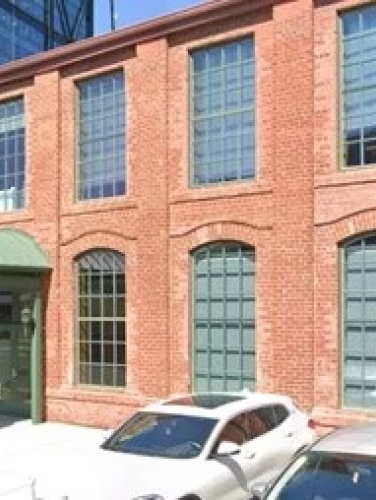
Tompkins Machine Shop
(ca. 1905)
The Tompkins Machine Shop shows how industrialist D. A. Tompkins grew his business by becoming a leader in each phase of the textile manufacturing process.
1900 South Blvd, Charlotte, NC 28203
The Tompkins Machine Shop reflects the natural progression of the textile industry business that Daniel Augustus Tompkins (1851-1914) developed in Charlotte from the 1880s to the early 1900s. With business partners Edward Arthur Smith (1862-1933) and Robert M. Miller, Jr. (1856-1925), Tompkins’ namesake D. A. Tompkins Company began constructing cotton and cotton seed oil mills and electric plants throughout the South in 1883. In 1889, the three men launched the Charlotte Supply Company to sell the machinery and equipment needed to operate the city’s many new mills. Three years later, Tompkins, Smith, and Miller decided to construct and operate their own Atherton Cotton Mills, Charlotte’s sixth cotton mill. The next logical step: start manufacturing the very textile machinery and equipment that their Charlotte Supply Company once sold for other manufacturers, necessitating the construction of the Dilworth Shops of the D.A. Tompkins Company.
Property Quick Links
The son of an Edgefield, South Carolina planter, Tompkins studied engineering at Rensselaer Polytechnic Institute. He then leveraged his work experience as a chief machinist for Pennsylvania’s Bethlehem Iron Works to secure a franchise from the Westinghouse Machine Company to sell and install steam engines and other industrial machinery. He arrived in Charlotte in March 1883, drawn by the city’s excellent railroad facilities, to launch his textile industry career.
By the early 1900s, Charlotte had developed a diversified industrial base thanks to the city’s dynamic textile economy, elite rail system, growing work force, and plentiful and inexpensive power. As textile production became largely automated by the late 1800s, the need for machinery, equipment, and supplies spurred the establishment of ancillary industries that either served the vast new cotton economy or processed cotton by-products. Those related manufacturers increased and diversified the region’s manufacturing base of the region, including machine shops, pump and elevator manufacturers, iron works, engineering firms, mattress factories, fertilizer plants, and cotton oil processors. So many of those related companies had operations in Charlotte that the city became both the center of the textile industry and the leading producer of textile mill machinery and equipment in the South. Soon after the turn of the century, the Tompkins Company acquired the Fairmont Machine Works of Philadelphia, gaining control of so many patents and patterns for producing specialized looms, mill equipment, and machinery that Tompkins could boast how his company had the largest and best line of textile machine patterns in the South. With that came the need for larger manufacturing facilities.
In 1901, the D.A. Tompkins Company purchased a site in the new suburb of Dilworth, and between 1902 and 1905, built the foundry and machine shop complex, which was known as the Dilworth Shops of the D.A. Tompkins Company. Following Tompkins’ 1914 death, his namesake company was dissolved, and the Tompkins Machine Shop was acquired by the American Machine and Manufacturing Company. Various manufacturing concerns occupied the buildings for much of the twentieth century until the machine shop was ultimately repurposed for various office and commercial uses.

